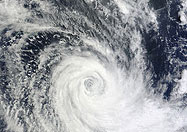Google, Microsoft drive geospatial crisis

A leading researcher has warned that Australia faces "a critical shortage of graduates" to keep up with an explosion of demand for professionals in geospatial technologies.

NASA satellite image of Tropical Cyclone Ului(Image by NASA Goddard, CC2.0)
Professor Chris Rizos, head of the University of New South Wales UNSW School of Surveying and Spatial Information Systems, claimed that numbers of qualified professionals and specialists in the areas of GPS, satellites, 3D imaging, and airborne and terrestrial laser scanning were "dangerously low" in a speech to the world congress of the International Federation of Surveyors held in Sydney last week.
Rizos explained that companies such as Google and Microsoft, or industries interested in environmental monitoring, climate change, security and disaster response were driving demand for professionals that was unable to be met with current volumes of graduates.
"The number of sectors using geospatial skills is mind-boggling, including satellite systems, agriculture, climate, disaster response, urban planning, car satnav (satellite navigation) and mobile devices, telecommunications, environment, mining, manufacturing, construction and global security," he said.
"Technology has revolutionised the world of surveying and spatial information in general but we can no longer meet the needs of industry and government," said Rizos.
"A recent US survey suggested that people with these skills are now required across 146 of the fastest growing occupations."
Rizos claimed that Australian surveyors were ageing, with only 20 per cent of the profession being in their 20's. He calls this "the lowest proportion ever".
The professor claimed that Australia's geospatial schools needed to attract more students.
"And that is a real crisis for both our economy and higher education," he said.